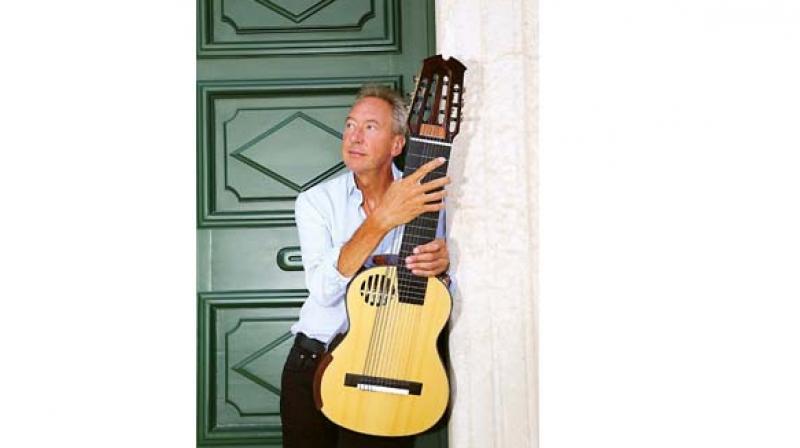Anders' Guitar, Body Brain.
Swedish musician Anders Miolin upcoming concert in the city will see him play a unique guitar that was created by him.

A ‘regular’ guitarist, as we know, would be talking about the six-string fretted instrument which is played by either strumming the strings (usually made of metal) or picking them with a guitar pick.
A classical guitarist, on the other hand, will talk about plucking the six nylon strings individually by hand on a classical guitar. But Swedish classical guitarist Anders Miolin is known for playing on a 12 or 13 string guitar - both his innovations. A quick look at the two instruments will reveal the extra strings abutting from the neck of the guitar and a discerning listener will catch the extra notes they make. They look and sound different just as his name – Anders - mean in German.
On his way to Bengaluru from Zurich where he is a professor of guitar at the University of Arts to play a concert titled The Eternal Moment at the Bangalore School of Music, Miolin talked of his music and creations during a layover at Dubai airport. He brings with him the 12-string guitar which is not only unique but has an unpronounceable name (at least in this part of the world): DwDEKA guitar.
Developed in 2017 by Miolin and Ermanno Chiavi (incidentally, the 13-string guitar is named the Chiavi-Miolin guitar), Miolin happens to be the only musician in the world to play it. With an extended tuning range and the ability to play “rare compositions from the Baroque, Classic, Romantic and Impressionist period”, the musician harps on the ‘fascinating sound universe’ that these guitars present.
As he pointed out: “Six strings are not enough for my inner vision of sound. With this guitar I can compose, composers write new pieces for me and I can arrange a vast amount of repertoire written for piano, violin, cello and viola da gamba.” As he puts it, the DwDEKA guitar is a greatly extended guitar which does not replace the piano (though its range can match it) but has more ‘colour possibilities’ than a piano or a regular guitar. “Sorry pianists,” he added.
A virtuoso performer, a 15-year-old Miolin began his studies at the Music Conservatory in Copenhagen, and afterwards continued with his training with classical guitarists Per-Olof Johnson in Malmo and later, Oscar Ghilia in Basil. The intense training and foray into music at an early age is explained rather simply without a fancy narrative, “Music was already inside me.” As plain as that or as profound.
For the concert, apart from his own compositions like Azure Sonata written especially for this guitar, he will be playing compositions by Davin Kellner, Bach, Chopin and Erik Satie. But when you hear these on Miolin’s guitar, his concepts of colour and sound universe become clear. For instance, Satie’s Gnossienne no. 1 is simple, minimalistic and almost hypnotic when played on a regular classical guitar. When Miolin plays it on his guitar, other notes soar in and the composition sounds considerably different; in fact, vibrant is the word. As with any interpretation of a classical piece, the response to this is polarising, with some raving over it and some panning it for the embellishments added by virtue of arrangement and sound. Miolin, however, believes that music reflects the beauty, variety and depth of nature and the best way to appreciate his music would be in a concert. As he propounds, “Enjoy the moment.”
Classical music, he insists, is beneficial for brain development and will improve focus. He is even writing a book, Guitar, Body and Brain which elaborates this knowledge. “That is why music learning for children is paramount!” And by teaching music, the teacher also evolves as a musician. “If you need to explain things, you finally understand them.”
Talking of his tryst with Bengaluru, he has visited the city earlier as well, he hopes it will be healthier to live in with time. “The people are very friendly and mostly relaxed,” he observed. When in this part of the world, he professes a great admiration for Carnatic musicians and their profound music. “Carnatic music has similarities with Western Baroque music, although the core of Western music is harmony,” he commented, adding that if he had had an option to play an Indian instrument, it would be a bansuri (flute) or the veena. “I would love to play these two instruments.”
What: The Eternal Moment
When: February 2, 6.30pm
Where: Aruna Sunderlal Auditorium, The Bangalore School of Music

